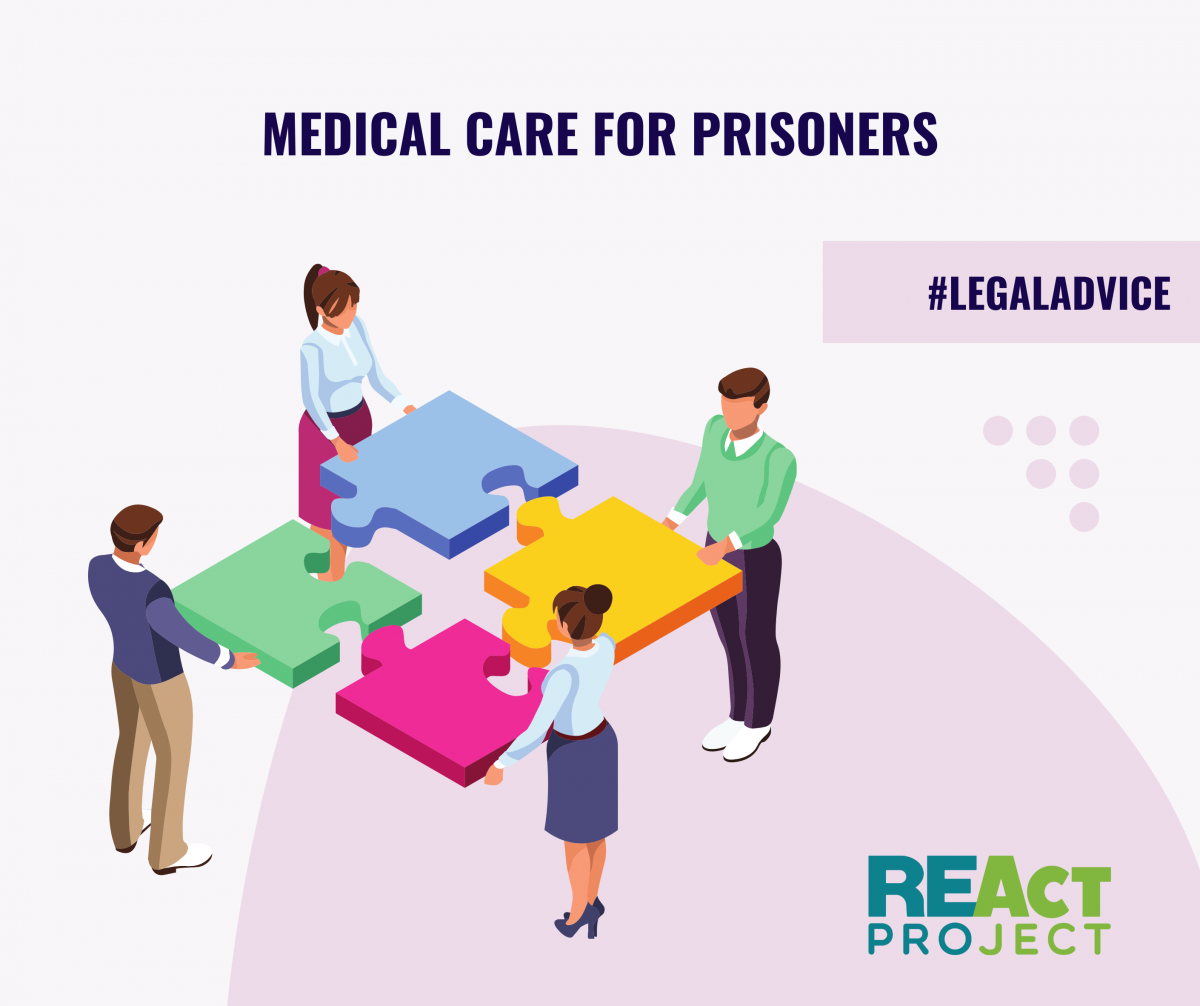Rights violation incidents recorded by the REAct project often include failure to provide medical care to incarcerated inmates in detention and prison settings. Correctional officers do not respond appropriately to prisoners’ requests, arguing that “jail/prison is not a spa resort.”
However, applicable regulations require that individuals sentenced to imprisonment have the right to health care within the scope prescribed by the Law of Ukraine on Health Care, except for certain restrictions expressly provided for by law. Responsibility for the health of prisoners rests with the administration of the correctional facility concerned, as well as employees of facilities that report to the Health Center of the State Penitentiary Service of Ukraine (SPS).
Convicted individuals have the right to seek professional advice and treatment both in the medical facilities of the Health Center of the State Penitentiary Service of Ukraine, which operate in relevant correctional settings and must provide free medical services to incarcerated inmates and in any other health care facilities licensed by the Ministry of Health of Ukraine, including private ones. The costs of related services and medicines to be purchased in this case should be covered by prisoners, their family members or friends at their own expense.
The Right to a Free Choice of Physician.
Any prisoner has the right and is free to choose from among qualified physicians, health care facilities, or treatments based on the recommendations provided. Convicted inmates or their relatives have to contact the chosen medical practitioner and, once their consent is obtained, inform the correctional facility’s administration of the scheduled date and time of the appointment.
The algorithm to be used here is as follows: the convicted prisoner contacts the physician of the SPS health care facility and asks for an appointment with the chosen doctor. Within 24 hours thereafter, this physician must prepare a medical opinion and file a request to the facility administration for permission to allow the chosen doctor to see the patient. This request must be approved by the head of the SPS health care facility in question.
In this case, all expenses related to the provision of paid medical services (including those provided by the chosen doctor), as well as the purchase of medicines, medical devices (patient care items), technical and other equipment for rehabilitation, are outside the scope of public funding, shall be borne by the convicted inmate (recipient of care), their close relatives, or other parties involved. The medical opinion will serve as the grounds for providing the medical care requested.
The Right to Be Examined and Treated in Other Health Care Facilities.
If any additional examinations needed cannot be performed by SPS health care facilities (e.g., if they are outside of the scope pre-determined and require equipment, laboratories, or medical care other than that available on site), such examinations should be carried out by another health care facility where they may be performed, within the time frame specified in the medical (opinion) report.
If inpatient treatment is required, the convicted inmate has the right to contact the physician of the SPS health care facility requesting that medical assistance be provided by another health care facility that has the capability to provide the necessary medical services both at public expense and at prisoners’ own expense. The physician of the SPS health care facility must consider the request and draw up a medical report with their professional opinion on the matter at hand no later than the next working day after the request is made.
Convicted inmates have the right to be provided with free medicines in SPS health care facilities, which are available or should be made available. If a prisoner wishes to use some other medical supplies for their treatment that are not available in a health care facility (medical unit) within the correctional system, the same can be obtained from family members based on a medical opinion from the physician of the correctional facility. Prescribed based on the medical opinion, the medical drugs thus obtained are not handed over to the prisoner per departmental regulations and policies, but transferred to the SPS health care facility for the prisoner’s treatment. The incarcerated inmate will be offered to take these medicines only in the presence of the designated medical worker of the SPS health care facility. The only exceptions are medications necessary to maintain the prisoner’s vital functions. All medicines must be in standard undamaged factory packaging.
The convicted inmate’s family members or other persons involved are required to submit an application for the transfer of said medicines, medical devices (patient care items), technical and other equipment for rehabilitation. The application form must be attached to the prisoner’s medical record. Once the care package containing the items required is delivered, the prisoner has the right to review the itemized list of contents enclosed (medicines, medical devices (patient care items), technical and other equipment for rehabilitation intended for his or her treatment), confirming this by their signature on the application form. Medicines and medical devices (patient care items) provided by prisoners’ family members or other persons involved shall be stored by SPS health care facilities in separate cabinets and listed in the record log for medicines, medical devices (patient care items), technical and other equipment for rehabilitation received from prisoners’ family members and other persons involved. Prisoners are required to sign the log after the completion of the treatment course and have the right to monitor the use of their medical drugs.


